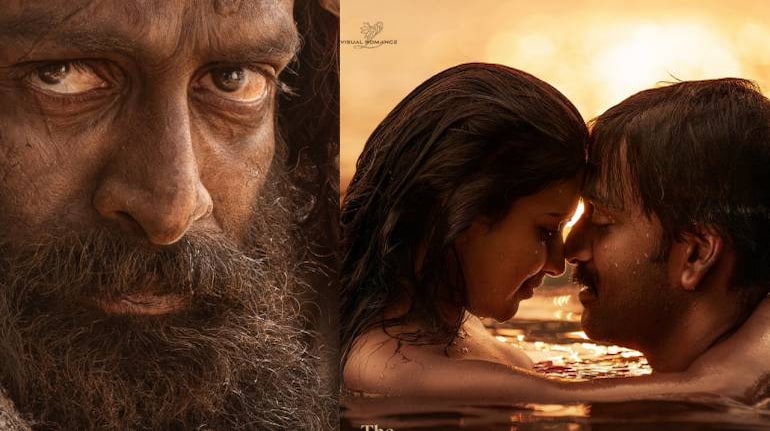Aadujeevitham, The GoatLife review: Prithviraj Sukumaran’s searing film is a worthy adaptation of a bestseller
Aadujeevitham is a harrowing Malayali migrant story told with dignity. Prithviraj Sukumaran's punishing physical transformation in the film, also known as The GoatLife, is astounding. AR Rahman's Periyone brings a lump to the throat, though his background score feels intrusive in places.
March 28, 2024 / 04:24 PM IST

Prithviraj Sukumaran plays Najeeb, a river sand miner from Kerala who tries to migrate to the Gulf for better opportunities but ends up getting stuck, working as a goatherd in the middle of a desert. Amala Paul plays his pregnant wife. (Images via X/@DirectorBlessy)
A man puts his face to the water and drinks. He is not alone. The camera pans to show us his companions – goats. He is one among them, a beast who has forgotten what it is to be human.
Adapting Benyamin’s bestselling novel Aadujeevitham for the screen is no joke. Based on a real-life incident, Najeeb’s story has acquired epic proportions in the popular imagination in Kerala, and for good reason.
Set in the early '90s, Aadujeevitham (The GoatLife) recounts the harrowing experience of Najeeb, a young man who leaves home for the promise of the prosperous Gulf. But something goes wrong somewhere, and he ends up as a goatherd in the middle of the desert. No salary. No luxury. Not even water to wash his backside.
The struggle of the Malayali migrant is a subject that cuts close to the bone, but Aadujeevitham is also a story about the human will to survive. That perhaps explains why the original Malayalam edition of the novel alone has been reprinted over a hundred times.
Blessy’s film stays true to the spirit of Benyamin’s sparing, almost journalistic account. Najeeb (Prithviraj) works as a sand miner in his hometown, leaping into the river and bringing back buckets of sand. The water is blue-green, the land is verdant. He is then plucked out of this landscape and planted in a sea of sand. The film plays up this contrast to great effect, making the viewer as hungry as Najeeb to catch a glimpse of a blade of grass.
There is nothing remarkable about Najeeb, and Prithviraj plays him as a polite, hesitant, somewhat naive man who has small dreams for his young family. Amala Paul is striking as Sainu, his pregnant wife – maybe too striking, because the choreographed romance between them looks oddly cinematic in this otherwise starkly realistic story. But still, there are moments in this stretch that function powerfully as echo scenes later. Najeeb and Sainu discussing mutton soup and biryani, and later, Najeeb holding a leg of mutton to his chest as the goats – his brethren – surround him. It’s a beautifully constructed character arc that shows the viewer how much Najeeb has transformed. Who does he now identify as? What does the violence of the gunshot make him choose?
The desert is a character in the film, and so are the goats and the camels. You cannot direct these. You have to wait and capture them when they’re in the mood to look directed. That’s what cinematographer Sunil KS does – from a grain of sand to the wide expanse of the unceasing desert, from the face of a frisky goat to the eyes of a patient camel, the visuals never make you forget Najeeb’s relationship with the landscape. Najeeb’s loneliness is so immersive that you spontaneously applaud when you sense the end of his sojourn – it’s a wonderfully conceived scene, slapping you awake with a contrast that you’d desired so badly along with Najeeb.
AR Rahman’s background score, however, feels like an intrusion in many frames where silence or the diegetic sounds of the desert may have made the experience more visceral. That said, ‘Periyone’ is remarkable in its positioning and leaves you with a lump in the throat.
Not everything from the novel has made it to the screen, and not everything on the screen is in the novel. Fans of the book might be disappointed that some truly moving passages have been left out, but this is inevitable. Literature offers room for the reader to imagine the best and the worst with a few words. Not everything can be shown in a film just as powerfully or with the subtlety that it demands.
Prithviraj’s punishing physical transformation for the role is astounding. Just as Najeeb loses track of the days, we too don’t know how long it has been since he arrived in the desert. When we see his emaciated form, it comes as a shock – but more shocking is his reconciliation with it. The guttural voice that emerges from the actor hints at the fact that Najeeb hasn’t spoken to another human in a long time, and the regression is also significant in his ‘goat’ life.
KR Gokul as the earnest Hakeem is shaky in some of the stretches or maybe it’s due to the staging that looks slightly theatrical. But the young actor grows on you through the long trek in the sand, and pulls off a brilliant scene that punches you in the gut. The mysterious Ibrahim Khadiri (Jimmy Jean-Louis) also leaves an impression, marking the many contradictions between good and evil that are embedded in the narrative.
Blisters on the feet, chapped lips, hair in dreadlocks – the heat and grime that live in Najeeb’s body feel palpable to the viewer, thanks to the makeup department. The VFX work is commendable, too. There’s Malayalam, Hindi and Arabic being spoken on screen, and only some of the Hindi and Arabic dialogues have subtitles (in Malayalam, if you’re watching the Malayalam version). On the one hand, this allows you to experience Najeeb’s lack of comprehension when he lands in the Gulf, but on the other hand, this is a disadvantage for those who prefer watching the film in its original language but don’t know it. English subtitles all through may have improved the reach of the film for an audience outside Kerala, dubbed versions notwithstanding.
Is there a god or isn’t there? That’s the question that Benyamin’s novel left me with when I read it many years ago. Is the unforgiving yet astounding desert proof of god’s existence or is it proof that such a merciful being doesn’t exist? Does god live in the eye of the goat that gazes at Najeeb with compassion? Or did god die before the Arab unleashes his brutality on Najeeb? It is enough that the movie made me grapple with these dilemmas again, as I walked out with AR Rahman’s haunting ‘Periyone’ ringing in my ears once again.
Discover the latest business news, Sensex, and Nifty updates. Obtain Personal Finance insights, tax queries, and expert opinions on Moneycontrol or download the Moneycontrol App to stay updated!













